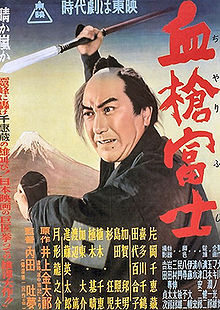Chiezō Kataoka
Chiezō Kataoka | |
|---|---|
片岡 千恵蔵 | |
 Chiezō Kataoka in 1920s or 1930s | |
| Born | March 30, 1903 |
| Died | March 31, 1983 (aged 80) |
| Nationality | Japanese |
| Occupation | Film actor |
| Years active | 1912–1983 |
Chiezō Kataoka (片岡 千恵蔵, Kataoka Chiezō) (March 30, 1903 – March 31, 1983) was a Japanese film and television actor most famous for his starring roles in jidaigeki.
Career[]
Born in 1903 in Gunma Prefecture (his real name was Masayoshi Ueki), he was raised in Tokyo. As a child he began training in Kabuki in a theatre troupe run by Kataoka Nizaemon XI, and appeared in one film in 1923.[1] He eventually entered the movie world for good in 1927 first at , but following the lead of other former Makino stars like Tsumasaburō Bandō, Chiezō started his own independent production company, , the next year.[1] That studio became the longest lasting of the independent, star-centered productions, in part because it had such talented directors as Mansaku Itami and Hiroshi Inagaki, and produced such masterworks as .[2] He folded the company in 1937 and joined Nikkatsu.
Specializing in jidaigeki, he played the lead in various films before and during World War II. During the Occupation of Japan, however, when Allied censors restricted the production of jidaigeki, Chiezō also appeared in a series of eleven films as Bannai Tarao, a modern era detective who is a master of disguise.[3] He eventually joined Toei, where he also served on the board of directors. Among his starring roles for Toei were eighteen films in which he played Tōyama no Kin-san[4] and a three-part Daibosatsu Tōge. Another role was in Akō Rōshi, a drama based on the Forty-seven Ronin. Later, he portrayed the father of Ōoka Tadasuke in the television series Ōoka Echizen. His career spanned six decades.
Family[]
His son, Yoshiharu Ueki, a former pilot, was named the president of Japan Airlines in January 2012.[5]
Filmography[]

- Chūkon giretsu: Jitsuroku Chūshingura (1928)
- (国士無双 Kokushi musō) (1932)
- (赤西蠣太) (1936)
- Singing Lovebirds (鴛鴦歌合戦 Oshidori utagassen) (1939)
- Bannai Tarao (多羅尾伴内 Tarao Bannai) (1946)
- Bloody Spear at Mount Fuji (血槍富士 Chiyari Fuji) (1955)
- (Kuroda sōdō) (1956)
- Akō Rōshi: Ten no Maki, Chi no Maki (赤穂浪士 天の巻 地の巻) (1956)
- Ninkyō Shimizu-minato (任侠清水港 Ninkyō Shimizu-minato) (1957)
- Dai-bosatsu tōge (大菩薩峠) (1957)
- Kunisada Chūji (1958)
- Akō Rōshi (赤穂浪士 Akō Rōshi) (1961)
- Ōoka Echizen (TV series) (1970)
- Amigasa Jūbei (TV series) (1974), Nakane Masafuyu
- Sanada Yukimura no Bōryaku (1979), Sanada Masayuki
Honours[]
References[]
- ^ Jump up to: a b Okabe, Ryū (1979). "Kataoka Chiezō". Nihon eiga haiyū zenshū: danyūhen. Tokyo: Kinema Junpō. pp. 144–148.
- ^ Mika Tomita, ed. (1997). Chie Puro jidai. Firumu Ātosha. ISBN 4-8459-9769-X.
- ^ "Kataoka Chiezō". Nihon jinmei daijiten+Plus. Kōdansha. Retrieved 3 February 2012.
- ^ "Chiezō Kataoka profile". NHK. Retrieved August 4, 2021.
- ^ "JAL names ex-pilot as new president". Channelnewsasia.com. Retrieved 22 January 2013.
External links[]
| Wikimedia Commons has media related to Chiezō Kataoka. |
- Chiezō Kataoka at IMDb
- Kataoka Chiezō at the Japanese Movie Database (in Japanese)
- Chiezō Kataoka at NHK
- 1903 births
- 1983 deaths
- Japanese male silent film actors
- Film studio executives
- 20th-century Japanese male actors
- Recipients of the Medal with Purple Ribbon
- Recipients of the Order of the Rising Sun, 4th class
